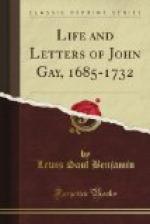[Footnote 16: Johnson: Lives of the Poets (ed. Hill), III, p. 274.]
[Footnote 17: Swift: Works (ed. Scott), XVIII, p. 42.]
[Footnote 18: Swift: Works (ed. Scott), XVII, p. 161.]
[Footnote 19: Mrs. Howard.]
[Footnote 20: Sir Robert Walpole.]
[Footnote 21: An allusion to “The Beggar’s Opera,” which Gay was then writing.]
[Footnote 22: Printed for the first and only time in “An Account of the Life and Writings of the Author,” in Plays Written by Mr. John Gay, 1760.]
CHAPTER VIII
1727
“THE BEGGAR’S OPERA”
The opera to which allusion is made in Mrs. Howard’s letter of October, 1727, was “The Beggar’s Opera,” upon which Gay had been actively engaged for some time past, and which was then nearing completion. “You remember,” Gay wrote to Swift, October 22nd, 1727, “you were advising me to go into Newgate to finish my scenes the more correctly. I now think I shall, for I have no attendance to hinder me; but my opera is already finished."[1] To which Swift replied from Dublin on November 27th: “I am very glad your opera is finished, and hope your friends will join the readers to make it succeed, because you are ill-used by others."[2]
It was natural that Swift should be especially interested in “The Beggar’s Opera,” because the first suggestion of it had come from Swift in a letter to Pope, written as far back as August 30th, 1716[3] “Dr. Swift had been observing once to Mr. Gay, what an odd pretty sort of thing a Newgate Pastoral might make,” Pope once remarked. “Gay was inclined to try at such a thing for some time, but afterwards thought it would be better to write a comedy on the same plan. This was what gave rise to ‘The Beggar’s Opera.’ He began on it, and when first he mentioned it to Swift, the Doctor did not much like the project. As he carried it on, he showed what he wrote to both of us; and we now and then gave a correction, or a word or two of advice; but it was wholly of his own writing. When it was done neither of us thought it would succeed. We showed it to Congreve, who, after reading it over, said: ’It would either take greatly or be damned confoundedly."[4]
Dilatory as Gay always was, he contrived to finish his opera by about the end of the year. “John Gay’s opera is just on the point of delivery,” Pope wrote to Swift in January, 1728. “It may be called, considering its subject, a jail-delivery. Mr. Congreve, with whom I have commemorated you, is anxious as to its success, and so am I. Whether it succeeds or not, it will make a great noise, but whether of claps or hisses I know not. At worst, it is in its own nature a thing which he can lose no reputation by, as he lays none upon it."[5] Not only Swift, Pope, and Congreve were doubtful as to the opera’s chance of success. Colley Cibber refused it for Drury Lane Theatre, and even when it was accepted by John Rich for his theatre in Lincoln’s Inn Fields, Quin had such a poor opinion of it, that he refused the part of Captain Macheath. Very sound was the judgment of Rich, immortalised by Pope in “The Dunciad” (Book III, lines 261-264):—




